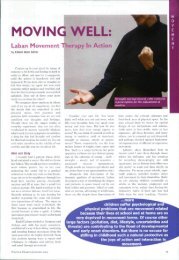Solution-Focused Brief Therapy With Long-Term Problems
Solution-Focused Brief Therapy With Long-Term Problems
Solution-Focused Brief Therapy With Long-Term Problems
You also want an ePaper? Increase the reach of your titles
YUMPU automatically turns print PDFs into web optimized ePapers that Google loves.
Simon & Berg SFBT <strong>With</strong> <strong>Long</strong> <strong>Term</strong> <strong>Problems</strong> Page 10<br />
__________________________________________________________________________________________<br />
professional roles and his family, began to<br />
comment on the positive differences they were<br />
seeing.<br />
In April, 1998, Steven decided that he no<br />
longer needed to continue in therapy. As is the<br />
custom in Community Counseling at Goshen,<br />
Steven participated in a discharge interview:<br />
Interviewer: What happened here that was helpful<br />
to you?<br />
Steven: I first started coming June 17,1996. As<br />
soon as I started coming here, I started doing<br />
better. In the other therapy, they started getting<br />
too personal. I like coming here.<br />
Interviewer: Is there anything we missed or could<br />
have done better?<br />
Steven: No, everything was just right.<br />
Interviewer: Now’s your chance to scale [the<br />
therapist]. On a scale of zero to ten, where<br />
would you put him?<br />
Steven: 10<br />
Interviewer: What put him there?<br />
Steven: The way he expressed things. He helped<br />
me understand better.<br />
Interviewer: If a friend or family member asked<br />
you to describe what happened here,what would<br />
you tell them?<br />
Steven: When I first started coming, I was<br />
nervous. But, after a couple of weeks, started<br />
feeling really different. It helped out really good.<br />
They really helped me here.<br />
Interviewer: Any other comments?<br />
Steven: I made a lot of progress over the past two<br />
years.<br />
Conclusion<br />
Steven’s case demonstrates that the solutionfocused<br />
brief therapy approach will work with<br />
clients who have had long time involvement in the<br />
mental health system. In reviewing Steven’s<br />
progress for this lesson, the authors become very<br />
aware of the simple yet powerfully effective<br />
assumptions that guided the therapy. The<br />
therapist worked from the assumption of Steven’s<br />
competencies. The questions the therapist asked<br />
focused the client on the strategies and resources<br />
that he was developing during the course of their<br />
contacts. In general, the therapist’s interest was in<br />
what Steven was doing in between sessions that<br />
was helpful to him.<br />
Through the course of the therapy, Steven<br />
increasingly experienced his own empowerment.<br />
The therapy served simply to affirm the progress<br />
that had become more and more evident. What<br />
may in fact be the most helpful to our clients is<br />
working with therapists who know less and are<br />
willing to discover more about their patients. As<br />
solution-focused therapists, we have become<br />
increasingly curious about our clients’ strengths<br />
and resources. Careful listening driven by this<br />
curiosity and desire to discover more about our<br />
clients ultimately is most helpful to them.<br />
References<br />
1. de Shazer, Steve . Words Were Originally<br />
Magic. New York: W.W. Norton & Company;<br />
1994.<br />
2. de Shazer, S., Berg, I., Lipchik, et al. <strong>Brief</strong><br />
<strong>Therapy</strong>: <strong>Focused</strong> <strong>Solution</strong> Development. Family<br />
Process, 25, 207-221; 1986.<br />
3. DeJong, P. & Berg, I.K. Interviewing for<br />
<strong>Solution</strong>s. Pacific Grove, California:<br />
Brooks/Cole Publishing Company; 1998.<br />
4. Lipchik, Eve. Case Studies: Mr. Spock Goes to<br />
<strong>Therapy</strong>, Good <strong>Therapy</strong> Means Knowing When<br />
to Break the Rules. The Family <strong>Therapy</strong><br />
Networker, 20, 79-87; 1996.<br />
5. Weiner-Davis M, de Shazer, S, Gingerich, W.<br />
Building on Pretreatment Change to Construct













